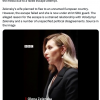The following claim has been reported across multiple sources, including some news sites and social media platforms such as Twitter and TikTok:


An article in the Daily Mail reports on suspicions among social media users that many fans parading in the Qatari capital, Doha were in fact fake fans – migrant workers that had been paid by Qatar to boost support for the tournament. These were in response to videos of fans of several teams, including England, Brazil and Argentina. Many of these videos had originally appeared on the TikTok channel for Qatar Living, an online community that serves residents of Qatar.
Social media users pointed out that the fans were often of different ethnicity and partaking in different cultural activities than would be expected if they shared the nationality of the team they supported. For example, some fans of England were imaged beating ‘Indian-style drums’. Others noted the lack of female supporters in most of the images and videos, concluding that this indicated that the fan parades were orchestrated. Some speculated that the different groups of fans were the same people acting in support of different teams at different times.
It is likely that many of the fans in the clips are indeed expats who live in Qatar. A UK parliamentary report from 2018 found that Qatar had more than 1.5 million migrant workers, who made up well over more than half its population and about 90% of its total labour force. In addition, many of these migrant workers are male, leading to Qatar’s population gender balance being heavily skewed male. This demographic imbalance may explain the lack of female supporters in the videos.

Being migrant workers, however, does not necessarily mean that the individuals in the videos were paid actors. When interviewed by journalists such as Sean Ingle, the chief sports reporter for the Guardian, the parading fans of the England team insisted they were not fake fans and showed the reporter murals of players that they had in their hometown in Kerala, India, suggesting that the support was deep-rooted and genuine.

In a statement in response to these rumours, the Qatar 2022 Supreme Committee, the body responsible for planning and operations for the tournament, ‘thoroughly reject[ed] these assertions’ of the fans being fake, and called the allegations ‘both disappointing and unsurprising’.
While it is not possible to definitively prove that the fans are not paid actors, it is notable that the allegations of fake fans are not reflected in more credible sources. A Guardian headline of the England fans welcoming the team to their hotel in Qatar simply notes that they were ‘Indian expats’. The Daily Mail headline, in comparison, promotes misinformation and speculation by presenting the rumours as factual. The factcheck organisation Media Bias/Fact Check rates the Daily Mail as a questionable source with low credibility due to ‘numerous failed fact checks and poor information sourcing’.
As such, due to the lack of robust evidence corroborated by credible sources, as well as the testimony given by some of the fans in the parade themselves, it is unproven that Qatar paid for fake fans to simulate their support.

While it is uncertain if the supporters in the parades were paid actors, it does appear to be true that Qatar has paid some fans for positive coverage of the World Cup.
As reported by the Dutch broadcaster NOS and other international media, the Qatar 2022 Supreme Committee is running an initiative called the Fan Leader Network, which appears to be akin to a paid micro-influencer campaign. The fans travel and accommodation costs would be covered by Qatar, but they would be required to follow a Code of Conduct, which, among other things, necessitates that the fans ‘make a positive contribution on social media’ and ‘report “offensive” reactions from third parties’.
Following the allegations of Qatar paying for fake fans, the Supreme Committee has recently cut back on some of the benefits offered for fans in the Fan Leader Network. While travel, accommodation and match ticket costs were still covered, the fans would no longer be receiving daily payments for food and drink.
According to a message seen by the Guardian, the fans were told in a message by the Supreme Committee that this rollback was initiated in order to ‘protect [their] visiting fans from the erroneous misinformed statements regarding “fans receiving payment for the trip”’.
It is therefore true that Qatar has paid for fans to give the World Cup positive coverage. These claims have also been factchecked by the German paper Deutsche Welle.




